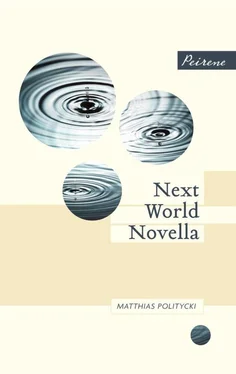Matthias Politycki - Next World Novella
Здесь есть возможность читать онлайн «Matthias Politycki - Next World Novella» весь текст электронной книги совершенно бесплатно (целиком полную версию без сокращений). В некоторых случаях можно слушать аудио, скачать через торрент в формате fb2 и присутствует краткое содержание. Год выпуска: 2011, Издательство: Peirene, Жанр: Современная проза, на английском языке. Описание произведения, (предисловие) а так же отзывы посетителей доступны на портале библиотеки ЛибКат.
- Название:Next World Novella
- Автор:
- Издательство:Peirene
- Жанр:
- Год:2011
- ISBN:нет данных
- Рейтинг книги:4 / 5. Голосов: 1
-
Избранное:Добавить в избранное
- Отзывы:
-
Ваша оценка:
- 80
- 1
- 2
- 3
- 4
- 5
Next World Novella: краткое содержание, описание и аннотация
Предлагаем к чтению аннотацию, описание, краткое содержание или предисловие (зависит от того, что написал сам автор книги «Next World Novella»). Если вы не нашли необходимую информацию о книге — напишите в комментариях, мы постараемся отыскать её.
Hinrich takes his existence at face value. His wife, on the other hand, has always been more interested in the after-life. Or so it seemed. When she dies of a stroke, Hinrich goes through her papers, only to discover a totally different perspective on their marriage. Thus commences, a dazzling intellectual game of shifting realities.
Next World Novella — читать онлайн бесплатно полную книгу (весь текст) целиком
Ниже представлен текст книги, разбитый по страницам. Система сохранения места последней прочитанной страницы, позволяет с удобством читать онлайн бесплатно книгу «Next World Novella», без необходимости каждый раз заново искать на чём Вы остановились. Поставьте закладку, и сможете в любой момент перейти на страницу, на которой закончили чтение.
Интервал:
Закладка:
With great determination she led him to the basement of the building — grey, carpeted floor, functional atmosphere — where suddenly her mood became reverential. She stopped in front of a gilt-framed painting perhaps one and a half metres wide by just under one metre high. In the picture … the surprised Schepp turned to his companion, but she was gazing in silent fascination, so he had himself to come to terms with the fact that the painting showed not a cold, dark lake but a huge island, a monumental, towering wall of rock, a rocky curve around a group of cypress trees with a flickering violet-tinged sky in the background. Before the island, as Schepp’s eyes became accustomed to the gloomy hues, he saw a boat making for its shore, with a white, muffled figure standing in front of a coffin draped with white cloth. He could also make out various steps and openings in the rock resembling archaic portals. Just to make sure, he glanced at the picture’s title. He had already realized that a few strokes of the oars would bring a new corpse to the island, to be placed on a plinth or in one of the burial chambers. Yes, the island impressed him; there was something so fundamentally desolate about it that he imagined the peace of the dead reigning in that place as a dignified form of despair. What fate as dark as those cypresses awaited the newly dead?
Only then did Schepp focus on what little the painting showed of the cold lake itself — water so calm that it reflected the vertical walls of rock without any tremor on its surface, motionless all the way to the horizon, which was nothing but a straight line. An endless, dead sea.
How, he finally whispered to Fräulein Dorothee, did she know it was a lake? She seemed unwilling to abandon her mood of rapt attention.
Anyone could see that, she said.
He gave up on the muted whispers appropriate for a museum. Lake or not, it certainly wasn’t empty; there was even an island in it, a place where life went on, as it were, for the dead. Wasn’t that prospect worth something?
‘Please forgive me,’ Fräulein Dorothee interrupted him without taking her eyes off the picture, ‘but it’s not an island.’
They stood in front of the painting for a long time, so long that one of the attendants wandered over and confided in a friendly tone that this was his own favourite picture. After he had turned away to keep an eye on the other visitors lingering only briefly in front of various pictures, Fräulein Dorothee explained.
Anyone could see, she said, that the painting was intended to be surreal; it skilfully kept its real subject hidden; the island was nothing but a reflection, an illusion that the painter had added as a kind of consolation. The boat, the ferryman, the muffled figure were all concessions to the taste of the time. The whole thing might just be reflected light from the depths of the lake, designed to lure us into the next world. ‘Oh, Hinrich,’ she said, the words wrenched out of her, ‘I don’t want to go there.’
At that moment it happened: it because Schepp himself was not quite sure what he was doing when he began to speak, telling her that he wasn’t afraid of death; he would simply die before she did and scout out the terrain for her.
‘Would you really do that for me?’ asked Fräulein Dorothee after a while.
Schepp nodded mutely; he could not even begin to feel certain of the full import of her question. Then he added: if he died first he’d wait for her — again, it was not like Schepp, growing bolder, to reach for Fräulein Dorothee’s little clenched fist, pressing it clumsily. And then, he said, he’d take her hand and go with her, they would reach the far shore together. Or at least the island. If the island turned out to be real.
The next moment he was wishing the ground could have swallowed him up. Fräulein Dorothee took a deep, audible breath, but she was looking at him, and not even in surprise, or with amusement or indignation –
‘Or we’ll drown together,’ she said, exhaling, also audibly. ‘At least that’s better than drowning alone.’
Still she did not withdraw her hand. As he turned to her slowly, looking cautiously at her through the thick lenses of his glasses, she seemed to be a hallucination which might dissolve into thin air if he regarded her too closely, translucent, untouchable, a creature from another star. And yet, and yet, she left her hand in his for an extraordinary length of time. She stood beside him, smiled at him, as if a burden had been lifted from her mind.
That decided things. In the same year, Dorothee Wilhelmine Renate, Countess von Hagelstein became Doro Schepp, rejecting a double surname, and instead of fulfilling the hopes of the East Asia department of the Faculty she soon became a mother, abandoning her dissertation and, to the horror of the entire teaching body, the promise of her glittering career. Nothing much became of the now fully qualified Dr Hinrich Schepp either, number one in the field of ancient Chinese language. His professor was able to prevent at least that.
Schepp found that he was now sitting on the floor, propped against one of the legs of the desk. If only he could go on sitting there, lost in his memories, maybe even dropping off to sleep, dissolving into the past, quietly disappearing. If it hadn’t been for that smell. Schepp turned away from the sun; since his operation he hadn’t been able to tolerate bright light. He moved around the desk without rising from the floor. He was now looking at Doro’s legs, the kimono hanging down below her knees. Almost at once he was wide awake and slid closer. Looked at Doro’s swollen calf. Oh no, how fast it was changing, marbled in shades of pale violet; she would have hated that. Schepp groped in her direction, finally grasped one of her legs, then pressed cautiously with his other hand, trying to banish the ugly marks of livor mortis from her calf; that was its name, wasn’t it, livor mortis , discolouration after death. But where to make the marks go? First he tried upwards, then he pressed down equally towards her slipper. There was a dull sound. Alarmed, Schepp hit his head and saw Doro’s hand dangling in front of him. This was too much. He took the hand and held it firmly until it stopped moving, until he had calmed down. Held it as he had held it twenty-nine years ago, as he had promised he would if the worst happened. Now at last he was doing just that.
‘I’m here with you,’ he promised Doro’s hand tenderly. ‘I’m holding you tight. Even if you can’t feel it any more, we’ll get through this.’
A while later he was standing beside her, moved to tears by his own solemnity, and placing her left arm back on the desk. However, it immediately slipped off again. First Schepp had to straighten Doro’s torso. That was difficult; it was almost impossible to correct the angle of her throat and neck. But though he had to push and pull quite hard, he tried to comfort himself with the thought that he was helping Doro, even with these pitiful efforts — just as she would help him one day. From now on she would wait for him on the shore of the lake, ready to offer him her energetic little hand as soon as he found himself there with her. On their wedding day she had told him she would do for him exactly what he had said he would do for her.
If she were the first to die, she said, she would wait there for him; it would be better to go together, whatever happened, much better.
She had renewed that promise on all of their wedding anniversaries, and although Schepp was as sceptical as ever about the existence of the lake and all the rest of it, he did not express his doubts, and indeed saw the promise as reassurance that their marriage would last for ever.
Curiously enough, today Doro’s idea of the next world did not seem to him at all ridiculous but perfectly credible, indeed consoling. He was glad he could cherish one last hope of seeing her again. A lake was better than nothing. How frail she looked! Only now did it strike Schepp that she could no longer disguise her frailty with the radiant smile he had always loved. She sat in his desk chair like a porcelain doll, her nose a little sharper than usual, her cheeks visibly paler, as pale as — Schepp couldn’t help thinking of the new waitress, the look she had given him when he had settled his bill the previous night, and her captivatingly pale face.
Читать дальшеИнтервал:
Закладка:
Похожие книги на «Next World Novella»
Представляем Вашему вниманию похожие книги на «Next World Novella» списком для выбора. Мы отобрали схожую по названию и смыслу литературу в надежде предоставить читателям больше вариантов отыскать новые, интересные, ещё непрочитанные произведения.
Обсуждение, отзывы о книге «Next World Novella» и просто собственные мнения читателей. Оставьте ваши комментарии, напишите, что Вы думаете о произведении, его смысле или главных героях. Укажите что конкретно понравилось, а что нет, и почему Вы так считаете.












